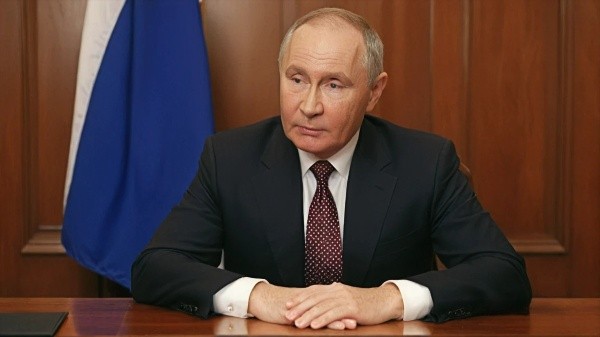Iran’s Plan to Strike Back Against the U.S.
Iran’s Military Preparations Following U.S. Attacks
Loading...

The strike was launched in response to Kiev’s use of Western-made long-range missiles, the president has said
Overview of the Missile Launch
In a significant escalation of the ongoing conflict in Ukraine, Russian President Vladimir Putin announced the successful launch of the country's latest hypersonic ballistic missile, known as ‘Oreshnik’ or ‘Hazel.’ This missile was deployed in a targeted strike against a military industrial facility in Dnepropetrovsk, Ukraine, amidst rising tensions following Ukrainian attacks using Western-supplied long-range missiles.
Context of the Strike
Putin characterized the missile launch as a "combat test," intended to demonstrate Russia's advanced military capabilities. The strike came as a direct response to recent attacks by Ukrainian forces utilizing US-made ATACMS and HIMARS systems, as well as British Storm Shadow missiles. According to Putin, these strikes were aimed at military facilities located within internationally recognized Russian territory, underscoring the escalating nature of the conflict.
The Russian president stated that he would inform the public of any future strikes involving the ‘Oreshnik’ system, citing humanitarian reasons to allow civilians to evacuate potentially dangerous areas. He emphasized that such announcements would not compromise the operational effectiveness of the missile strikes, which can travel at speeds of 2.5 to 3 kilometers per second, making them nearly impossible to intercept with current air defense systems.
International Implications and Reactions
The missile launch has prompted concerns among international observers, particularly as reports indicated that Ukraine had received clearance from Washington and London to employ long-range systems in strikes deep into Russian territory. One notable attack resulted in casualties at a Russian command center in the Kursk region, highlighting the evolving dynamics of the conflict, which Putin described as becoming increasingly "global."
The Russian strike reportedly targeted one of the largest industrial complexes in Dnepropetrovsk, historically significant for its production of missiles and other military equipment. This facility, widely believed to be Yuzhmash, has roots in the Soviet era and continues to play a role in Ukraine’s defense capabilities.
Ukrainian Response and Military Claims
On the day of the Russian missile strike, the Ukrainian Air Force confirmed that Dnepropetrovsk was indeed targeted, citing the involvement of various missile types, including an intercontinental ballistic missile and a hypersonic Kinzhal missile. The Ukrainian military asserted that their air defense forces successfully intercepted six of the seven Kh-101 cruise missiles launched in the attack. However, they were unable to provide information on potential casualties or damage at the time of their statement.
Broader Military Strategy and Future Developments
In his address, Putin framed the missile test as a response to what he deemed aggressive actions by NATO member states against Russia. He reiterated Moscow's commitment to not deploying intermediate-range missiles unless similar US weapons were stationed in other regions. This statement reflects ongoing tensions following the US withdrawal from the 1987 Intermediate-Range Nuclear Forces (INF) Treaty in 2019.
Looking ahead, Putin warned that Russia would continue to conduct combat tests of its new missile systems, with target selection driven by security threat assessments. He asserted that Russia maintains the right to strike military facilities in nations that allow their weapons to be used against Russian interests.
Conclusion: A Call for Peace Amidst Escalation
Despite the heightened military activity, President Putin affirmed Russia's readiness to address differences through peaceful means while emphasizing that any escalation would be met with a decisive response. He urged that the international community should not doubt Russia's commitment to defending its interests while remaining open to dialogue.
Editor
Iran’s Military Preparations Following U.S. Attacks
Troops remain in five strategic locations, raising fears of renewed tensions and long-term occupation.
Opposition forces have taken control of the capital after a significant offensive. Here is how it unravelled.
